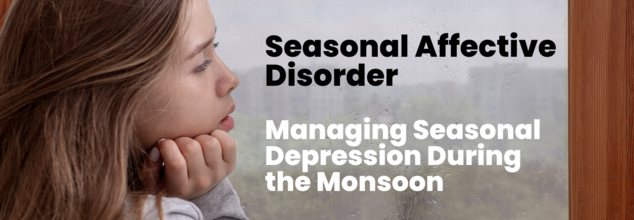
Monsoon Depression (Credit-Freepik)
Seasonal Depression Is Real: Expert Tells What Are The Best Ways To Deal With It
Many of us feel down and a bit less energetic when it is raining or if it is the rainy season, some feel it in winter. Some chalk it up to fewer things to do and feeling tired because they didn’t sleep well, but it could be Seasonal affective disorder (SAD). SAD is a form of depression that follows a predictable pattern, typically starting in the fall and lasting through the winter. It can leave you feeling drained and moody, but these symptoms usually improve during spring and summer. If you suspect you might have SAD, don't ignore it. There are effective treatments available, including light therapy, counselling, and medication. By seeking help, you can maintain your mood and energy throughout the year.
What makes SAD worsen?
According to Dr. Dharmesh Shah, Founder and Director of Holistica World, a practising psychologist for 24 years, “Seasonal depression tends to worsen during the monsoon due to several factors, including reduced sunlight, higher humidity, and lower temperatures. The lack of sunlight can disrupt your body's internal clock and reduce serotonin levels, which can lead to feelings of depression.” Sunlight plays a huge role in treating SAD as well.
The rainy weather can lead to increased feelings of isolation, as people are more likely to stay indoors. This, combined with the natural changes in the environment, can exacerbate symptoms of SAD. Physical discomforts like body pains and mood swings can also become more pronounced during this time.
What are the effective coping mechanisms?
No mental health issue is completely predictable, sometimes it hits us at the most inconvenient times like a public place or a traffic jam and feeling extremely anxious, in that case, Dr. Shah suggests assessing the situation and your safety as a first step, knowing how safe you are can help you, “To manage anxiety, practice deep breathing and stay aware of your body's responses. Listening to calming music or watching something on your phone can be great distractions.” He also suggests some effective coping mechanisms.
Acknowledge the condition and its triggers
Seasonal affective disorder (SAD) is a type of depression that typically occurs during the fall and winter months. It can be triggered by reduced sunlight exposure, changes in sleep patterns, and hormonal fluctuations. Recognizing these factors can help you understand your symptoms and develop effective coping strategies.
Maximize sunlight exposure
Even on cloudy days, spending time outdoors can significantly boost your mood. Aim for at least 30 minutes of sunlight exposure daily. If outdoor access is limited, consider using artificial light therapy, which simulates sunlight.
Engage in physical activity and hobbies
Regular exercise is a powerful tool for managing SAD. It releases endorphins, which can help improve mood and reduce stress. Additionally, engaging in activities you enjoy can provide a sense of purpose and fulfillment.
Maintain a healthy diet
A balanced diet can support your overall well-being and help regulate your mood. Focus on consuming whole foods, fruits, vegetables, and lean proteins. Avoid excessive amounts of processed foods, sugary drinks, and caffeine.
Practice grounding techniques
Grounding techniques can help you stay present and reduce anxiety. Deep breathing exercises, mindfulness meditation, and yoga can all be effective tools. Prioritize a consistent sleep schedule to ensure adequate rest.
Seek social support
Connecting with friends and family can provide emotional support and reduce feelings of isolation. Joining support groups or online communities can also be beneficial, as you can connect with others who understand your experiences.
Utilize technology
Technology can be a valuable resource for managing SAD. Listen to calming music, practice mindfulness through meditation apps, or watch uplifting videos to boost your mood.
Employ healthy distractions
Engaging in enjoyable activities can help you cope with negative emotions. Try listening to music, watching a movie, reading a book, or pursuing a creative hobby.
Consider medication (If Necessary)
For severe cases of SAD, medication may be necessary. Consult with a healthcare professional to discuss your options. Remember to combine medication with lifestyle changes for a holistic approach.

Credit: Canva
Dopamine On Decline? Everyday Activities That Make You Unhappy And How To Fix It
"I am not feeling happy anymore", said my friend recently and I immediately resonated. But just a few moments later, it hit me that nothing had changed in my life. I was following the same routine for years, and still my happiness had somehow reduced. It was then that I thought of investigating the reason behind this sudden plunge in my dopamine.
I found that my everyday habits, like scrolling through social media, unhealthy screen timings and seeking immediate gratification in everything that I did, had led to my brain getting resistant to the 'Happy Hormone.'
So What Drives The Dopamine Plunge?
Recently, Dr Tara Swart, a renowned neuroscientist, took to social media to explain probable reasons behind this.
Here Are Everyday Activites That Could Be Responsible For The Decline In Your Dopamine:
Constant Social Media Scrolling
Social media platforms are designed to deliver small bursts of dopamine with every like, comment, or notification. "Every swipe and notification gives you a tiny dopamine hit," she wrote. Over time, the brain adapts, needing more stimulation just to feel normal. This reduces motivation for deep, meaningful tasks.
Multi-Tasking
Switching between tasks drains dopamine and increases mental fatigue. "Your prefrontal cortex (responsible for focus) gets overwhelmed quickly," Dr. Swart noted.
How to fix it? Use time management techniques like the Pomodoro method and working in focused intervals, to improve productivity and naturally boost dopamine. "Give your brain a clear task, and stick to it. Focused work boosts dopamine naturally when you complete something meaningful," she wrote.
Avoiding Celebrations
Many people chase the next goal without pausing to acknowledge their achievements. "If you never pause to celebrate, your brain doesn't get a chance to link effort with reward," she warned.
Junk Food And Sugar
Processed foods spike dopamine rapidly but also desensitise the brain over time, making normal meals feel less satisfying and driving cravings for unhealthy foods.
Binge-Watching Shows
Watching episode after episode delivers passive dopamine hits, reducing interest in more effortful but fulfilling activities.
Excessive Caffeine
Caffeine temporarily boosts dopamine, but excessive use can lead to dependency, making people feel tired without it.
Substance Abuse
Drugs and alcohol hijack dopamine pathways, leading to addiction and reduced pleasure from normal activities.
Avoiding Boredom
Constant stimulation prevents the brain from resetting dopamine levels. “When you avoid boredom, your brain never gets a chance to reset its dopamine baseline,” Dr. Swart explained.
Over-Rewarding Small Tasks
Treating yourself after every minor task dilutes the dopamine response, reducing the reward effect for bigger achievements.
Chronic Procrastination
Delaying tasks lowers dopamine release, reinforcing avoidance behaviour.
How To Fix It?
The good news is that dopamine levels can be balanced with mindful lifestyle changes. Dr Swart suggested structured digital detoxes, nutritious eating, and celebrating personal achievements as effective ways to rebuild motivation. "Let yourself be bored. Seriously," she advised, emphasising that low-stimulation periods are essential for a healthy brain.
Intrestingly, there has been a trend of Dopamine fasting that has taken the internet by storm recently. It is a practice where individuals limit their exposure to activities or stimuli that typically provide a surge of dopamine. Whether is a complete fast or reduction in activities, a break from dopamine stimulants can definitely boost your happiness.

(Credit-Canva)
Can Emotional Stress Really Damage Your Skin? Here’s The Science With Solutions
Skincare has become a common phenomenon among people of all ages. However, it is not a full proof way to have clear skin. Many people feel frustrated and anxious when they experience breakouts, despite having multiple step skincare routines. While a healthy skin depends on how well you eat, maintain a steady schedule and what products you use, a lot of it also depends on your mental and emotional state.
How Does Your Mind Affect Your Skin?
Research shows that your mind and emotions have a real impact on your skin. According to the British Association of Dermatologists 2016 study when you’re stressed, your body releases hormones that can cause skin problems.
Other studies from the same journal like the 2013 study on Phsychodermatology explains that people who practice mindfulness, like meditation, have less stress and healthier skin. Stress hormones can slow down wound healing, cause inflammation, and even make your skin age faster. Many people who go to the doctor for skin problems say that managing their stress is a big part of feeling better. It’s often hard for doctors to tell if skin problems cause emotional problems, or if emotional problems cause skin problems, because they’re so connected.
How Can You Build Better Skin Health?
Being mindful, which means paying attention to the present moment, can help your skin heal faster. Studies have shown that people who learn mindfulness techniques have better wound healing than those who don't. This means that when you calm your mind, your body can heal better too. The Cleveland clinic suggests that when you’re stressed, your body is in a “fight or flight” mode, and it’s not focused on healing, it is focusing on surviving. But when you’re calm, your body can focus on repairing itself. So, taking time to relax and be mindful can help your skin recover from cuts, scrapes, and other injuries.
Simple Steps To Take Care Of Your Skin
To have healthy skin, you need to take care of your mind and body. This means using gentle skincare products that don’t irritate your skin. You should also avoid things that are bad for your body, like smoking and too much alcohol. Here are some other ways to take care of your skin according to Mayo Clinic.
Mindful Skincare
As you cleanse or moisturize, feel the products on your skin. Acknowledge its role as a barrier, offering gratitude for its daily protection.
Listen to Your Skin
Observe subtle changes. Tightness signals dryness; pimples may indicate stress. Heed these cues to adjust your routine accordingly.
Avoid Toxins
Minimize intake of alcohol and processed foods. These can disrupt your body's balance, negatively impacting skin health and appearance.
Reduce Stress
Engage in calming activities like reading, music, or nature walks. These help lower cortisol levels, promoting clearer, healthier skin.
Sleep Well
Aim for seven to eight hours of undisturbed sleep. This allows your skin to repair and regenerate, resulting in a more radiant complexion.
Eat Healthy
Prioritize fruits, vegetables, and healthy fats. These provide essential nutrients for skin vitality and a balanced gut microbiome.
Protect from Sun
Use SPF 30+ sunscreen and protective clothing. This shields your skin from harmful UV rays, preventing premature aging and damage.
Stay Hydrated
Consume ample water throughout the day. Hydration plumps skin cells, promoting a smooth, healthy appearance and overall well-being.

(Credit-Canva)
Why Does Coffee Make Our Breath Smell?
Having a morning coffee to start your day, or a midday coffee to keep your day going, is the best feeling. It energizes you and helps you get through the day. But have you ever noticed how you are left with sour notes in your mouth and a foul smell. Does that mean you have bad hygiene or is it an indicator that you should not be having coffee?
The answer is neither, it is due to some compounds in the coffee. You may have noticed that this is the case with many other strong-tasting foods like garlic, onions, boiled chicken and other dairy products. The Mayo Clinic explains that food particles breakdown around your teeth leads to more bacteria and causes a bad smell. These foods enter the blood stream after you ingest, get carried to your lungs and affect one’s breath.
While it may seem like a minor issue, it can be noticeable to others and make us feel self-conscious. So, it's important to understand why coffee causes bad breath and what we can do to get rid of it.
Why Does Coffee Make Our Breath Smell
When coffee beans are roasted, they release certain chemicals that contain sulfur. According to MedlinePlus these sulfur compounds are a big reason why coffee makes your breath smell bad. Think of it like the smell of rotten eggs, but much milder. Coffee is also acidic, which means it can change the pH balance in your mouth, making it easier for bacteria to grow.
When bacteria grow, they release even more smelly sulfur compounds. On top of that, coffee can dry out your mouth. Caffeine acts a little like a dehydrating agent, and coffee also contains tannins, which stop your mouth from making enough saliva. Saliva helps wash away bacteria and food particles, so when your mouth is dry, these things stay around and cause bad breath.
How To Fix This Issue?
The best way to avoid coffee breath is to make some smart choices about how you drink your coffee. Experts suggest drinking black coffee, without any milk or sugar, is better for your breath. Milk and sugar can feed the bacteria in your mouth, making the smell worse. If you must add flavor, try stirring your coffee with a cinnamon stick or a vanilla bean. These natural flavorings can add a nice taste without causing bad breath. If you need a sweetener, try using sugar substitutes instead of regular sugar. If you have to use dairy, whole milk or half and half are better than skim milk, as skim milk contains more sugar.
If you're willing to try something other than coffee, there are some good alternatives that can still give you a caffeine boost. High-caffeine black tea or chai tea can provide a similar pick-me-up without the strong coffee smell.
Whether you drink coffee or not, good oral hygiene is essential for fresh breath. The sulfur compounds, acidity, and tannins in coffee can all contribute to bad breath. So, it's important to brush your teeth twice a day, floss regularly, and use mouthwash. If you drink coffee, you might need to pay extra attention to your oral hygiene
© 2024 Bennett, Coleman & Company Limited

